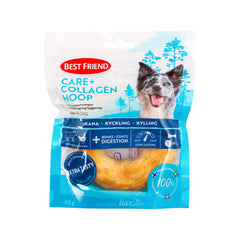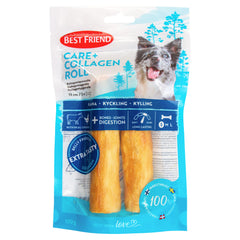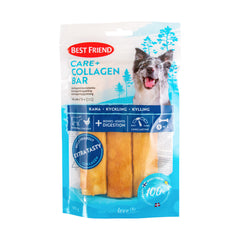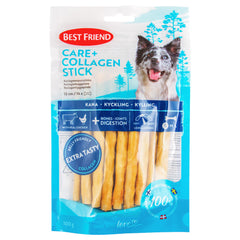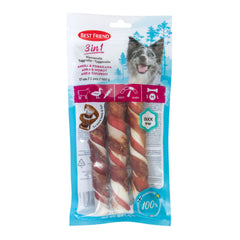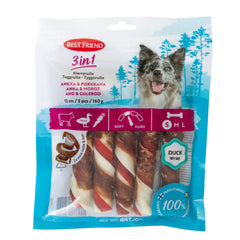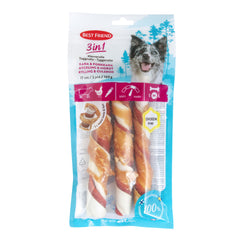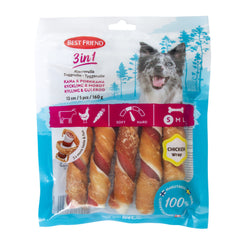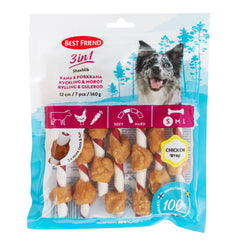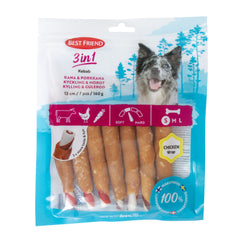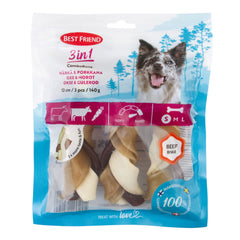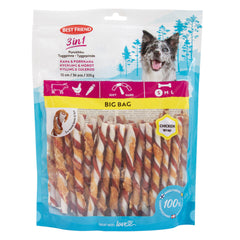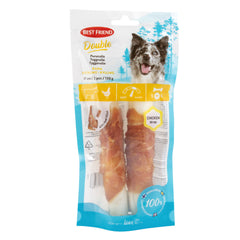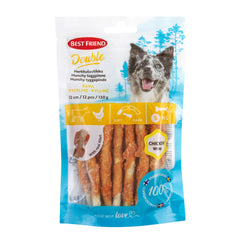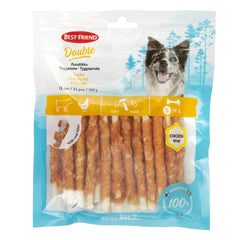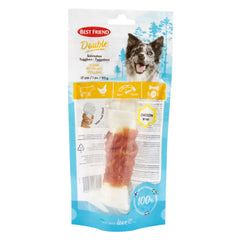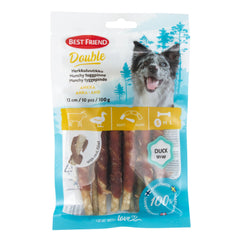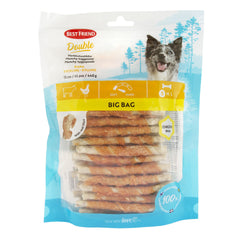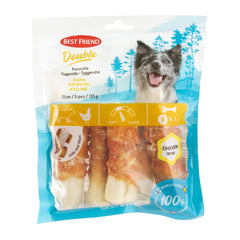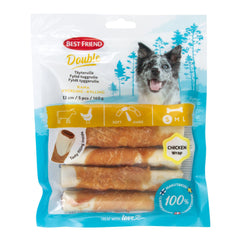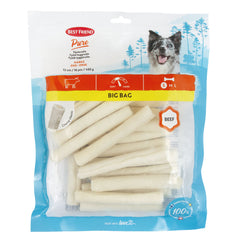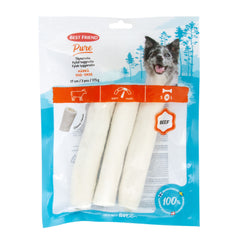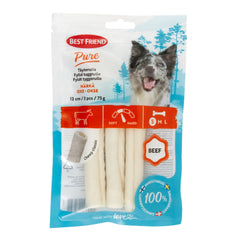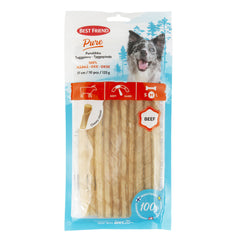
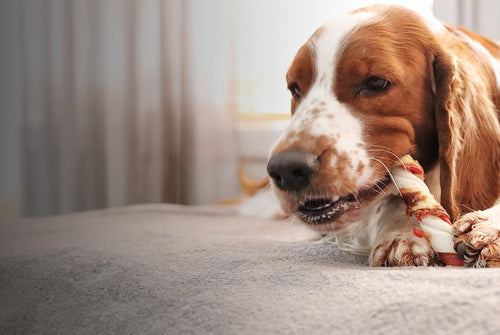
Chew bones as part of dog dental care!
Dog dental care is an essential aspect of a dog’s overall health. However, many owners may not realize the significant impact that dental health can have on a dog’s overall well-being. Dog chew bones are an effective way to keep a dog’s teeth healthy and strong.
Dog bones can help remove plaque and tartar. Plaque on the teeth is a sticky film formed by bacteria, saliva, and food particles that accumulate on the surface of a dog’s teeth due to daily eating and drinking. If plaque is not regularly removed through brushing or chewing on bones, it can harden into tartar.
Tartar, in turn, is solidified plaque that adheres tightly to the teeth and gums. Both plaque and tartar can lead to gingivitis (gum inflammation) in dogs and, if left untreated, more serious dental issues such as periodontitis.
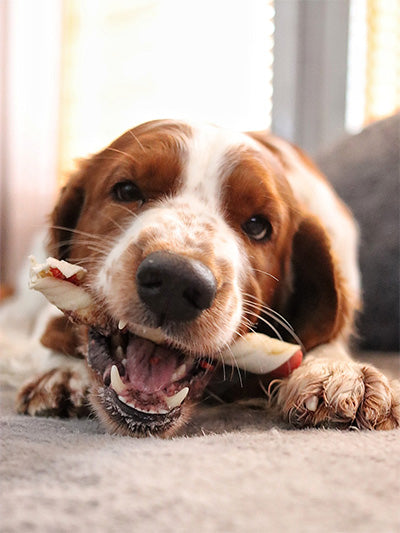
Dog chew bones serve as natural “toothbrushes” for dogs. When a dog chews on bones, it rubs them against its teeth and gums. During chewing, the structure of these bones helps dislodge plaque and tartar from the tooth surfaces.
Chewing also stimulates saliva production, which helps reduce bacterial growth in a dog’s mouth. Bones given to dogs can help prevent bad breath in pets. Bad breath often results from bacteria in the mouth and gum inflammation. When dogs chew bones, they stimulate saliva production, which helps neutralize bacteria and freshen their breath. Additionally, chewing on chew bones helps dislodge food particles from between the teeth, which can also reduce foul-smelling breath.
Best Friend Care+ Collagen Dog Chews - Pamper your dog with goodness!
Chew bones can also help strengthen a dog’s jaw muscles. These muscles play a crucial role in the dog’s digestive system by breaking down food and preparing it for swallowing. Depending on the dog’s breed and age, there may be variations in the size and strength of their jaw muscles. Healthy jaw muscles are essential for a dog’s overall health and well-being.
Furthermore, chew bones can alleviate a dog’s stress and boredom. Dogs have a natural urge to chew on things, and if suitable alternatives are not available, they may resort to chewing furniture or shoes. Bones provide pleasure and mental stimulation for pets. Dogs enjoy chewing on bones and they are especially beneficial for puppies, who are particularly eager to explore and bite objects due to their puppy teeth. By providing appropriate chew bones to your puppy, you can guide their biting behavior in a healthy direction while also aiding in proper dental development.
Choose the right-sized and right consistency chew bones for your dog. The chew bone should be durable enough to prevent it from breaking or posing a choking hazard. Additionally, make sure the bone is large enough relative to your dog’s mouth and suitable in material and hardness for the health of your dog’s teeth and jaw muscles.
Regular brushing and veterinary check-ups are also essential for maintaining your dog’s dental health. While chew bones do not replace these measures, they can be an effective addition to maintaining good oral hygiene.
So, the next time you consider your dog’s health, remember their teeth as well. By offering appropriate chew bones, you can help keep your dog’s teeth clean, strong, and healthy.
Best Friend 3 in 1 tuggben - 3 gånger mer smak och 3 gånger roligare

Chew Bones and Dog Dental Care: Expert Tips and Recommendations
Chew bones are a popular way to keep a dog’s teeth healthy and clean. Proper dental care for dogs is essential because poorly maintained teeth can cause pain and other health issues. While dog bones can be a beneficial part of comprehensive oral care, there are some tips and recommendations to follow when using them.
Choose the Right Type of Chew Bone for Your Dog
It’s crucial to select a bone that suits your dog’s size and chewing strength. A bone that is too small can pose a choking hazard, while one that is too large may harm the teeth or jaw joints.
Consider your dog’s size and age
Smaller breeds may benefit from smaller bones or soft treats. Larger breeds can be offered bigger, more durable options. Puppy age may also influence the best bone choice. Softer bones are suitable for puppies, while adult dogs can handle tougher alternatives.
Supervise Bone Chewing
Although chew bones are generally safe for most dogs, it’s essential to monitor your dog while they chew. If your dog chews too vigorously or if a bone fragment poses a choking risk, be prepared to intervene.
Ensure that the chew bone is suitable for your dog’s diet
If your dog has allergies or sensitivities, choose a bone that does not contain anything that could trigger these issues. If your dog’s digestive system is not accustomed to new bones, they can cause stomach problems such as diarrhea or constipation.
Remember to give chew bones in moderation. Excessive consumption of dog treats can lead to digestive problems or weight gain in your pet. Generally, the energy obtained from chew bones is relatively low because the dog also expends energy while chewing and gnawing on the bone.
Pay attention to your dog’s well-being during chew bone chewing
Some dogs may be sensitive to certain food ingredients or allergic to specific components. If you notice digestive issues or skin reactions after your dog consumes chew bones, consider trying a different type of chew bone product.
Overall, chew bones can be a beneficial part of dog dental care when used correctly. Choose an appropriate bone, ensure its safety, and supervise your dog while they eat. Also, remember to brush your dog’s teeth regularly and pay attention to overall oral health. Following these tips and recommendations will help keep your dog’s teeth healthy and clean.
Best Friend Double Tuggben - Alltid med riktig filé!
Preventing Dog Gum Inflammation and Other Oral Problems: How Chew Bones Assist in Dog Oral Care
A dog’s dental health is a crucial part of its overall well-being. The formation of tartar can lead to various issues, including gum inflammation, bad breath, and even tooth loss. Fortunately, there are several ways to prevent tartar buildup, and one effective method is offering chew bones to your dog.
If plaque is not regularly removed through brushing or chewing on chew bones, it hardens into tartar. Tartar, in turn, promotes bacterial growth and inflammation in the gums.
Dog bones are an excellent way to help keep a dog’s teeth clean and healthy. When a dog chews on bones, it helps dislodge plaque and prevents tartar formation. Chewing on chew bones also stimulates saliva production, which neutralizes acids in the mouth and reduces bacterial growth.
However, chew bones are not the sole method for preventing tartar formation. Regular brushing with a specialized dog toothbrush and toothpaste is also essential. You can also consult your veterinarian for recommendations on products designed for tartar removal or professional cleaning.
Overall, chew bones are a valuable addition to a comprehensive dental care routine for dogs. They not only provide a fun activity for your pet but also help maintain healthy teeth and keep bad breath at bay. Remember, though, that chew bones do not replace regular toothbrushing and veterinary check-ups.

